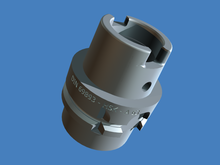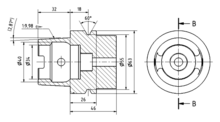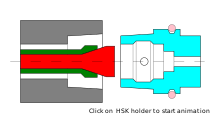Hollow shank taper
The hollow shank taper , called HSK for short, is used as a tool holder in machine tools . It can be seen as the successor and further development of the steep cone .
Special properties
- standardized according to DIN 69893
- smaller (approx. 30%) and lighter (approx. 50%) compared to the steep cone
- this also makes tool changes easier and faster
- high rigidity due to the support on the tool holder via the collar
- Transmission of torques
- Non-positive due to the cone and contact surface
- Form-fitting via the driving slots
- With drivers, jerky loads and large torques can be transmitted via positive locking
- excellent change accuracy (3 μm), due to
- Axial positioning accuracy is given to the flat contact on the collar
- the tight taper tolerance, concentricity deviations are minimized
- suitable for high speeds, as problems as a result of the widening of the spindle, as exist with the steep taper , do not occur; 2 reasons:
- the hollow tapered shank (inner part) is elastically pressure-preloaded when retracted. In contrast to the full steep cone, the expansion of the hollow inner part by centrifugal force takes place closer to the simultaneous expansion of the outer part. In connection with the clamping force reserve from elastic compression of the inner part, reliable torque transmission is still given at higher speeds than with the steep taper.
- the flat contact prevents slipping in the axial direction.
- The clamping of the hollow taper shank in the spindle is only possible in one position, provided an HSK form with driver is used. The index notch ("Deutsches Eck") is used for orientation
Hollow taper shank for lathes (HSK-T)
The only difference between the HSK-T and the previous HSK forms for rotating machining lies in the more closely tolerated drivers.


